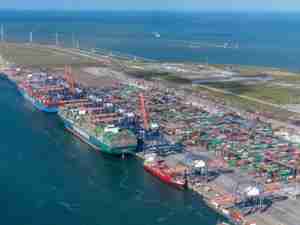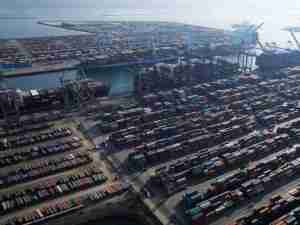Liverpool dockworker John Lynch arrived at a pivotal union vote last week with the kind of problems labor organizers dream of having.
There wasn’t space in the meeting room for a fired-up crowd of hundreds, which spilled into the hallways and onto the street to watch through open windows. There weren’t enough specially made T-shirts to go around. The buzz was loud enough to drown out the sound system, which was playing UK songwriter Billy Bragg’s 1980s anthem “There Is Power in a Union.”
Lynch had no problem getting the ballot result he wanted, though. Dockers at Britain’s fourth-biggest container port voted unanimously to reject their employer’s latest pay offer -- and walk off the job for two weeks in a strike that gets into full swing on Tuesday.
It’s the latest outbreak of the labor unrest that’s sweeping through key choke points of the world economy.
From the railways of North America to truckers in Peru, workers toiled through the pandemic to keep goods moving around, shielding supply chains from an even steeper collapse. Now they’ve had enough of watching livelihoods get eroded by soaring inflation while employers rake in profits. Their newfound militancy has gotten central bankers worrying about a 1970s-style wage-price spiral.
“Undervalued” was the word Lynch, 48, used over coffee last week to describe how the Liverpool dockers feel. “We’re still miles behind the pay at other UK ports, and we need a true evaluation of our rates of pay.”
Union ‘Renaissance’
The union says the offer it rejected amounted to a 7% pay rise and a one-time bonus of £750 ($856). UK inflation is running at around 10%.
Peel Ports Group, which owns Liverpool’s container terminals, disputes the claim that it’s low-balling. It says the package includes an 8.3% raise on salaries that are already above the regional average, with the highest-paid strikers making as much as £71,000 a year. Peel says the union demands amount to a rise in base pay of more than 12%.
With inflation an acute problem almost everywhere, that kind of argument is a global backdrop to labor disputes. In the strike on the banks of the River Mersey in northwest England, there’s a lot of local history at stake too.
With centuries-old traditions as a launching pad for British mercantilism -- and a hotbed of labor activism -- Liverpool still has a reservoir of angst among local longshoremen. Some of it is the legacy of one of Britain’s longest union standoffs a quarter-century ago, when the city’s dock workers suffered a crushing defeat.
The recent regrouping of Liverpool’s dock unions has been guided by people who were part of that 1995-1998 dispute, which drew national attention when Liverpool football player Robbie Fowler lifted his jersey after scoring a goal to reveal a T-shirt supporting 500 sacked workers.
This week’s walkout, involving more than 500 engineers and port operatives, isn’t just an old-timer revival though. There’s a younger generation leading the charge, armed with social media and seeking global allies. At the ballot meeting, organizers laid out a picketing plan designed for maximum international visibility.
The strike caps “a renaissance of union organizing on the docks in Liverpool,” said Katy Fox-Hodess, a lecturer in employment relations at Sheffield University Management School. “They have a very good chance of succeeding.”
It’s the culmination of a long road back from the 1990s, when “basically the entire workforce was made redundant,” Fox-Hodess said. Replacements, many of them strike-breakers, were hired via subcontractors on terms “far inferior to the other unionized ports.”
‘Got a Right’
The Liverpool strikers have won backing from counterparts at Felixstowe, the UK’s busiest container port, where another walkout is planned next week -- affecting about half of the nation’s capacity.
They’ve also earned the sympathy of locals like Brian Thompson, a ferry stage man who’s been “knocking around here for 35 years.”
“I don’t think they want to be greedy,” Thompson said, waiting to offload passengers as a ferry crossed the Mersey. “It’s just to keep level with inflation. I think they’ve got a right to that.”
The city’s industrial waterfront has for decades been a focus for redevelopment efforts that aimed to preserve the city’s maritime past while creating jobs in modern industries and tourism.
It’s a massive undertaking, given that there are some seven miles of docks -- roughly the distance between Battery Park in Lower Manhattan to 101st Street along the Hudson River. It’s come at a cost. Last year, Unesco removed the docks from its World Heritage List, saying development plans would mean an “irreversible loss” of historic character.
North of Liverpool’s downtown area, amid scrapyards and decaying buildings, is one sign of development not far from the port’s towering cranes: a £500 million stadium under construction for Everton, the second-most-famous Premier League team in the city.
But while English football is flush with cash, many businesses trying to compete globally have struggled in the aftermath of the UK’s split from the European Union –- which brought additional paperwork and costs for trade with EU countries. That could make Liverpool’s position as a gateway for goods crossing the Atlantic more important than ever.
Seeking to boost post-Brexit trade, the UK’s Tory government announced it would create new freeports -- low-tariff business zones to stimulate investment. Liverpool is one of eight to be designated.
That offers a chance for businesses to “shorten some of those supply chains,” said Elena Enciso, international trade manager at the city’s chamber of commerce. “That’s one of the main offerings of the Liverpool Freeport -- being a gateway to the whole world to come here.”
‘Trying Our Best’
Labor groups worry about another Tory plan. New Prime Minister Liz Truss has pledged a crackdown on unions, via legislation that will make it harder to vote on industrial action.
“This could be the last time that you can basically have a ballot to go on strike,” said Tony Nelson, a 65-year-old former dockworker who was one of those sacked in 1995. He’s now advising the organizers of the current dispute.
In 2000, Nelson founded The Casa, a trade union pub and community center in a Liverpool neighborhood known as the “Knowledge Quarter” because of its universities and theaters.
Inside are photos of past union leaders, books on the city’s labor history, and banners of the International Dockworkers Council, a federation of more than 140,000 workers that grew out of Liverpool’s activism.
In addition to being a hideaway from bosses, The Casa has also provided some refuge from inflation. A pint of ale still costs £3.50, compared with the £6.50 that the city’s waterfront hotels -- and many London pubs -- are charging these days.
“We’re trying our best to keep our prices down,” said its manager, Jacqui Richardson. “In the present climate, we just don’t feel like it’s fair to hit people again.”










